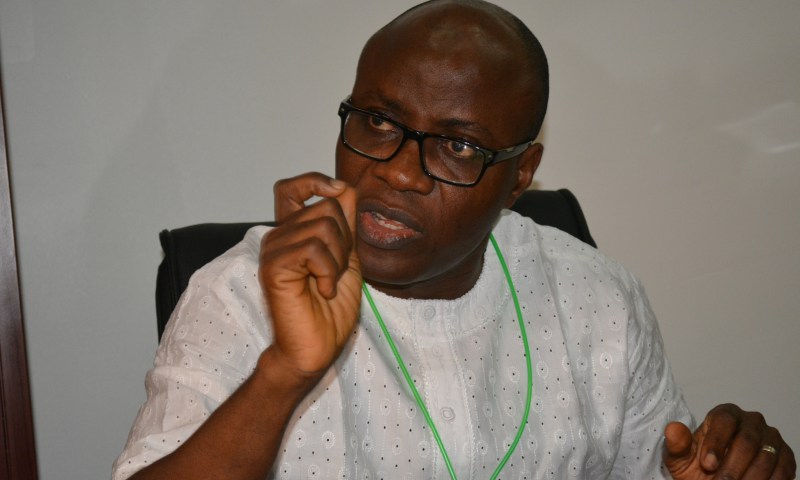The Nigeria Extractive Industries Transparency Initiative (NEITI) has identified Nigeria’s membership of Open Government Partnership as a timely platform to push for disclosure of beneficial owners of companies in the oil, gas and mining industries in the country.

Executive Secretary of NEITI, Waziri Adio, stated this recently while addressing a Consultative Forum on Open Government Partnership (OGP) in Abuja.
“Knowing how much companies paid in the form of taxes, royalty, rents etc. and how much government received is important, but not enough. Knowing those who are the real owners of the companies is critical to checking corruption, money laundering, drug and terrorism financing, tax avoidance and evasion,” Mr. Adio added.
He called on the Federal Government to enact a special legislation that will compel companies in the extractive sector to make public the names and identities of their real owners.
He also called on the President to issue an Executive Order on compulsory beneficial ownership disclosure by extractive industries companies in Nigeria. He explained that such legislation can be embedded or part of the Petroleum Industry and Governance Bill (PIGB) and should also constitute amendments to the Companies and Allied Matters Act (CAMA).
Mr Adio announced that nine countries including Nigeria have published EITI reports that disclosed the beneficial owners of one or more companies. Mr. Adio also told participants that 43 EITI implementing countries have published roadmaps on beneficial ownership out of which 20, including Nigeria, plan to establish public registers of beneficial owners by 2020.
The Executive Secretary, noted that NEITI has published a road map on beneficial ownership disclosure which provided clear definition of who beneficial owners are, the level of details to be disclosed and institutional framework that are required for effective implementation of beneficial ownership disclosure.
The document also defined Politically Exposed Persons (PEPs) and their reporting obligations, challenges around data collection, reliability, accessibility, timeliness and provided clear guides on them.
The NEITI Executive Secretary identified the absence of specific legal framework that imposes mandatory beneficial ownership disclosure as a major challenge to the implementation of ownership transparency in Nigeria.
While acknowledging the existence of laws like the Companies and Allied Matters Act, Freedom of Information Act, Code of Conduct and Tribunal Act and Public Complaints Commission Act as relevant legislations for beneficial ownership, he noted that there are other policies of the Nigerian government that support efforts at ownership disclosures. They include the Financial Action Task Force, Bank Verification Number, Automation and Access to Corporate Affairs Commission’s register.
Mr. Adio remarked that, because of the limitations of these policies and laws, they can at best be used as interim and complementary instruments while efforts should be made to make them more effective in demanding for the disclosure of the real owners of companies operating in Nigeria especially in the extractive industry.
He said that, in fulfillment of the requirement of the global EITI, NEITI duly reported beneficial ownership of companies covered in its 2012, 2013 and 2014 oil, gas and solid minerals audits. According to him, “in the 2013 oil and gas audit by NEITI, forty one (41) out of the forty four (44) companies covered responded to NEITI questions and inquiries by returning the completed templates on beneficial ownership. However, most of the ownership information were about the legal owners as opposed to the beneficial owners or real owners of the Companies”.
Mr. Adio identified delay and refusal to provide the real information on the audit templates, confusion over ownership structure (legal), conflict with existing confidentiality agreements, negative perception of beneficial ownership by covered entities (witch hunting), inconsistencies between beneficial ownership disclosures and information in CAC, use of surrogates by Politically Exposed Persons and government officials, as some of the challenges confronting NEITI.
Earlier in his presentation, the Attorney General of the Federation and Minister of Justice, Abubakar Malami (SAN), reiterated the commitment of the Federal Government to the implementation of beneficial ownership disclosure in Nigeria.
According to him, “more than ever before, the Government is determined to implement the legal basis on which beneficial ownership is founded from both an international and national perspectives”. Mr. Malami noted that some business entities exist solely on paper without the requisite obligation to list the real people who actually own or control them.
The Attorney General argued that “in the extractive industry, for example, these business entities are used to hold extractive rights and provide a channel for transferring extracted resources out of the host countries without paying specified royalties and taxes. These practices also allow the beneficial owners to avoid responsibility for violation of laws and regulations on labor and tax”.
Based on the requirement of the global EITI, NEITI has been doing some pioneering work in this direction since 2013.
The EITI defines beneficial owner as the natural person(s) who directly or indirectly benefits from, owns or controls the corporate entity. EITI standard requires that countries must disclose their beneficial owners by January 2020 and recommends establishment of beneficial ownership register.
The roadmap developed by NEITI on beneficial ownership envisaged the need for capacity building for all stakeholders that will be involved in the implementation of ownership transparency given the complexity of the extractive industries.
Nigeria was admitted into the Open Government Partnership (OGP) in 2016, following her commitment to the Open Government Partnership (OGP) Principles on Transparency, Accountability and Citizens Participation. One of the commitments under the Nigeria OGP National Action Plan is the need to ensure transparency of beneficial owners of businesses.
This commitment, says the NEITI, underscores the determination of Nigeria to fight corruption by ensuring transparency and accountability in the conduct of government business.
